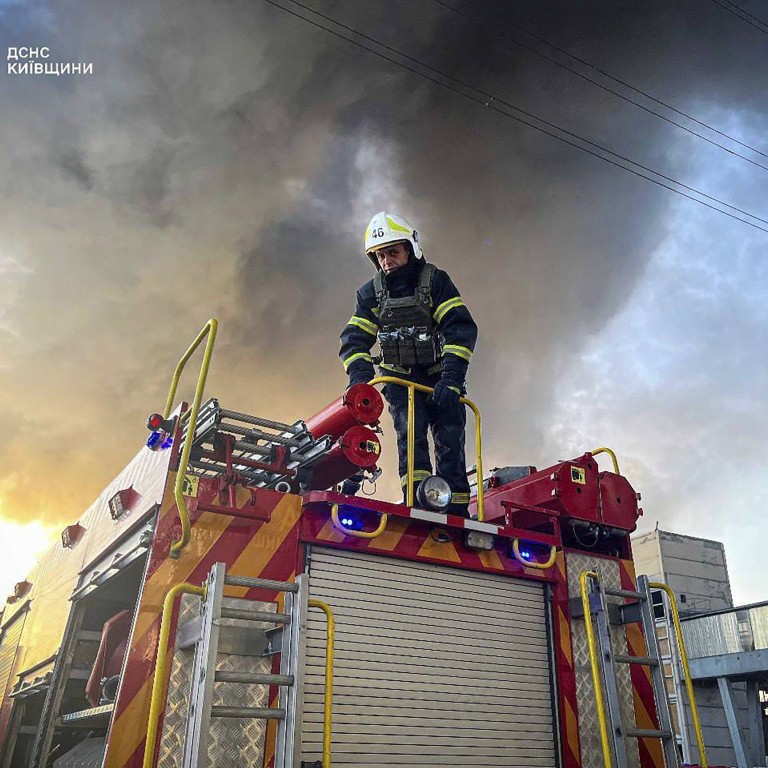On Saturday, the US House of Representatives
passed a US$95 billion foreign aid package that includes military support for Ukraine, Israel and Taiwan. The bill has since been
approved by the Senate and presidential approval awaits. Having been stalled for months due to Congressional infighting driven by the opposition of a pro-Trump faction of Republicans, things are now moving quickly.
This list of recipients offers a succinct summary of stretched US foreign policy commitments. Wars in
Ukraine and the
Levant rage on, while the US retains a watchful eye on the security dynamics of the
South China Sea. But no matter how you might rank these three priorities, there is no ambiguity as to which one is receiving the most budgetary attention.
The lion’s share of this US aid package is for Ukraine, with US$60.84 billion earmarked, including for military aid. There is pressing urgency for more US support, because of the relentless pressure Russian forces are applying on Ukraine. After 26 months, both sides are locked in an arm wrestle, unable to force the other to the table.
Ukraine’s embattled and outgunned armed forces have
lost ground. After months of stalemate, Russia’s troops are on a slow and costly march in the Donetsk region. Cities like
Avdiivka that had been fought over since the more limited Russian invasion began a decade ago have been captured by Russia.
The critical question is this: additional US military aid will help Ukraine avoid outright defeat but can it empower Ukraine to victory? Aid is also being provided by European countries, including efforts to seize profits from
Russia’s frozen assets to help Ukraine. But keeping Ukraine in the fight is only part of the challenge.
There is arguably a moral dilemma in which helping Ukraine to fight, rather than exploring other ways to end the fighting, contributes to prolonging the war. At one level, the ethical equation is clear: Ukraine is the victim of an illegal war and needs to be able to defend itself. And it is Russian aggression that is the main factor driving the war.
But, as a recent study of the failed peace talks between Russia and Ukraine in the early months of the full-scale invasion in March 2022 has shown, negotiations are possible. As I explored in my book on the run-up to the invasion, these talks, which took place in
Belarus, online and in
Anatolia with Turkish mediation, were hardly characterised by Russian honesty. Indeed, the Russian representative Vladimir Medinsky was out to impose a “victor’s peace” on Ukraine.
These talks fell apart for several reasons, including Ukraine’s leadership under President Volodymyr Zelensky feeling a mixture of devastation and elation: devastation that Ukrainians massacred in places like
Bucha had suffered, and elation that Ukraine’s armed forces were defying the odds by repelling the Russian march towards the capital, Kyiv.
The situation has moved on significantly since, and both Ukraine and Russia are stubbornly committed to their goals. For Ukraine’s leadership, it is to expel the Russians utterly. For Russia’s leadership under President Vladimir Putin, it is to bring at least a large part of the Ukrainian state under Moscow’s control.
Even if a return to negotiations is currently implausible, this will not necessarily be so indefinitely. War without end is costly, in human lives for the combatant countries and in budgetary terms for the US and Ukraine’s European partners.
There are risks in the currently preferred Western strategy of helping Ukraine restore its position of military strength, with two clear milestones.
The first is this coming summer: what state will the battlefield be in? There is a US-approved
programme for Ukraine to receive F-16 warplanes and pilot training from the Danish, Norwegian, Dutch and other European air forces in the coming months. What impact will the F-16 jets and other US and Nato-supplied weapon systems have?
The second milestone is the US presidential election in November. If Donald Trump wins, he has
threatened to fully reverse the policy of US aid to Ukraine. Which brings us back to the global picture, and of the different US regional commitments.
The largest Asian countries, notably
China but
also India, should be poised to play a positive role if the winds change around the Ukraine war. No matter what brings about this change, whether it is meagre Ukrainian gains on the battlefield or Trump’s return, an end to the war needs to involve the countries that have some sway in Moscow.
India and China are major trading partners with Russia and while the war in Ukraine is happening a continent away, playing some kind of de-escalatory role in the years to come will present a test of their diplomatic clout in this new and more Asian-centred century.
Diplomatic equities and influence do not come out of thin air, however, and it would be prudent in Beijing and New Delhi for preparatory steps to be taken in how positive influence could be exerted on Moscow whenever an opportunity to end the war arrives.
Two years ago, Turkey
tried in vain to mediate a swift end to the invasion, admittedly amid Russian duplicity and bad will. Perhaps it will take another two years or even more for a new window of negotiating opportunity to arise, and when it does, not only Europe and the West but also the wider world must be ready.
Dr Samir Puri is a war studies visiting lecturer at King’s College London, an associate fellow at Chatham House and author of “Russia’s Road to War With Ukraine”


